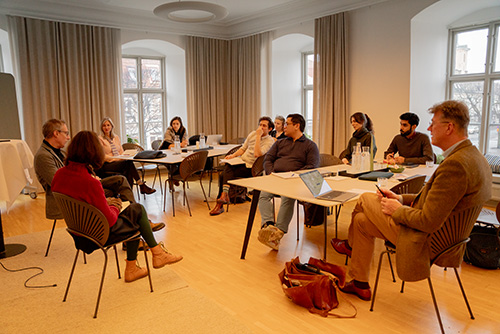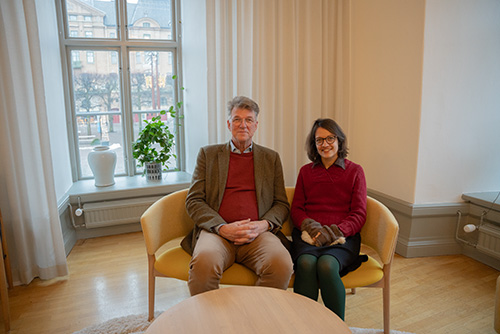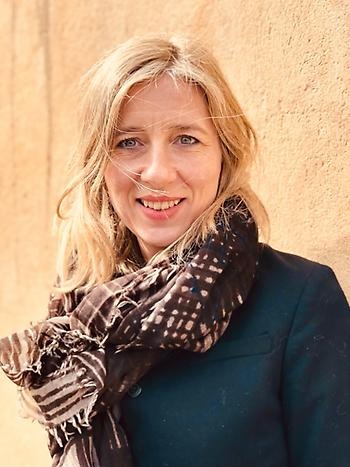Environmental footprints increase with digitalisation
On 16 and 17 January, a workshop was held in Jönköping that brought together both national and international researchers working in the field of ‘Eco media footprints’. It is a relatively new scientific research direction on the ecological footprint of information and communication technologies (ICT).

Photo by Scott Rodgerson on Unsplash
Internet streaming accounts for around 80 percent of global internet traffic. It is estimated to be responsible for about one percent of greenhouse gas emissions today. With the expansion of streaming, artificial intelligence (AI), cryptocurrencies, and the Internet of Things, (IoT) some predict that information and communication technologies will account for 14per cent of global electricity consumption by 2030.

Julia Velkova, Associate Professor of Media and Communication Studies at Linköping University, was one of the participants. She also moderated one of the roundtable discussions on media, data and energy relations. Julia does research on societal tensions that arise when digital media become more and more energy-demanding and energy-intensive.
“So-called data giants, such as Amazon and Microsoft, come to Sweden to establish their businesses, specifically for their server centres, and this creates social conflicts and problems for the local community. A specific example is Microsoft, which in Skåne received a lot of energy from the electricity grid while smaller local companies could not get hold of energy, which meant that they could not establish, so we are talking about various exclusion effects,” says Julia Velkova.
Julia Velkova says that in Sweden's welfare society, the principle is that infrastructure should be accessible to all, but now we see that there is a counter-polarization of public resources to provide digital communication.
“Basically, it's about questioning our own notions of sustainability and relationship to landscape, environment and how digitalization is fundamentally changing them and creating conflicts between businesses, citizens and politics. I think more interdisciplinary perspectives are needed and I think the workshop can broaden our understanding of what environment and sustainability mean when thinking about media and digitalization,” she says.
“Coming together like this across borders will be important in the future”
Göran Bolin, Professor of Media and Communication Studies at Södertörn University, says that workshops and conferences like this one are important because the participants come from a variety of disciplines and backgrounds.

Göran Bolin and Julia Velkova.
“Media production and consumption require more and more energy, especially now that generative AI is on the rise. Students are starting to use AI to a greater extent, and it is incredibly energy-intensive, which is an important question for the future. How much can this accelerate, how much energy will we need to produce and what does it compete with for other activities and companies? It's not just electricity that is used, huge amounts of water are used to cool the systems and server centres, for example. The fact that we can come together like this across borders will be important in the future. Not just for media research, but for all areas of social science, as these are such pervasive processes in society. We need to think about how to handle this,” says Göran Bolin.
The workshop discussed topics such as infrastructures, media, data and energy relations, carbonization of streaming media, (un)sustainable streaming and the contribution and development of the Eco media footprints area.
Annette Hill, Professor of Media and Communication Studies at the School of Education and Communication (HLK) at Jönköping University, organized the workshop, which was also digital as it included participants from other continents. Annette believes it is important to have these kinds of gatherings to share good ideas and talk to researchers from all over the world about the value of media and communication research and the social problem of sustainable media.
%20annette_profilbild.jpg)
Annette Hill
“The aim of the workshop is to develop a new way of thinking about the eco-media footprint - the environmental impact of streaming media, AI and the Internet of Things (IoT). In Sweden, the growth of data centres is talked about as important for Swedish business and society. At the same time, there are general values about the environment that are essential to talk about as well. The workshop was a good place to start this conversation,” says Annette Hill.
She is pleased with the workshop and believes that the research is important for the whole society.
“The research raises awareness that digital media is not green. What can we do about this? We need tools to think about and lobby for green media. This gathering taught us that there is a need for research and public debate on the footprint we make when using digital media and its impact on energy, water, communities and the climate in Sweden,” says Annette Hill.
The Internet of Things, (IoT) a collective name for the technologies that allow things with built-in electronics and an internet connection to be controlled or exchange data over a network.
